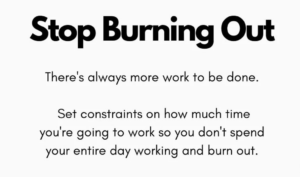
Burnout. Human. Emotions.
Vol 27, Issue 7, 1 November 2024
Emotional burnout is a state of emotional, physical, and mental exhaustion that occurs because of prolonged and excessive stress. This condition is characterized by feelings of fatigue, helplessness, and an inability to effectively cope with daily tasks. The concept of emotional burnout was first introduced by psychologist Herbert Freudenberger in the 1970s, to describe the experiences of professionals in helping professions such as doctors and social workers, but over time, it has become clear that anyone can experience emotional burnout, regardless of their profession.
Symptoms of burnout can occur not only in the workplace, but also in other aspects of life, such as during intense study periods for students or in the early stages of parenting for parents. Additionally, women who take on significant household responsibilities may also experience emotional burnout.
External factors that can contribute to burnout include:
– Work-related stressors, such as heavy workloads, long hours, or difficult relationships with colleagues or supervisors.
– Personal issues, such as financial difficulties, relationship problems, or health concerns.
– Lack of support from family and friends.
Factors contributing to professional burnout include:
– Poor working conditions: constant overwork, an uncomfortable workplace, and other aspects that negatively impact the quality of work.
– Problems in the team: misunderstandings and conflicts between colleagues as well as with management.
– Uninteresting tasks: responsibilities that the employee can no longer do or that they simply dislike.
– Low income: unfair pay or a low salary, leading to the need to seek additional sources of income and causing stress and anxiety.
– Emotional isolation: inability to discuss problems with colleagues or loved ones.
– Family or health issues: all of these factors increase inner tension and negatively impact work.
It’s worth noting, however, that professional burnout doesn’t always start with stress. It can sometimes develop against the backdrop of falling in love with one’s work. Psychologist Jerrold Greenberg, a professor at the University of Maryland in the United States, identified five stages of emotional burnout in his book “Stress Management”:
1. Honeymoon: A person enthusiastically plummets into work, and each task brings them joy. They seem to be on top of the world. However, at this stage, work starts to take up more and more time and begin to fill their entire life. If they don’t slow down, the second stage will begin.
2. Lack of Fuel: Productivity begins to decline, and tasks become more challenging and no longer bring the same joy. Fatigue sets in, and unfinished projects accumulate. There is not enough time or motivation to finish them. The person continues to work, pushing themselves to the limit.
3. Chronic Symptoms: Emotional and physical exhaustion sets in. The person becomes irritable and angry. They may experience headaches, insomnia, and other physical symptoms. Their relationships suffer, as they become less patient and understanding.
Constant fatigue begins to affect health, causing weakness, frequent ailments and worsening chronic diseases. Against this backdrop, a person may feel depressed, become irritable and begin to take out their bad mood on colleagues and loved ones. Crisis is the peak of emotional burnout, when a person experiences complete emptiness and apathy, losing the ability to enjoy life and relationships. They may even lose the ability to notice positive moments and rejoice in them. This can lead to deterioration of relationships with others.
Work and home problems accumulate like a snowball, making it seem impossible to escape from the vicious circle. The situation becomes increasingly difficult, and the threat looms over both career and physical health. According to scientists, burnout can lead to serious illnesses, such as depression, which requires immediate medical attention. In the early stages of burnout, recycling can become a habit, leading to chronic fatigue and psychological stress. According to WHO studies, this significantly increases the risk of stroke and heart disease.

- New Year’s mood - 22nd November 2024
- Minimalism is a way of life. Where to begin? - 15th November 2024
- Why do you need an air humidifier? - 8th November 2024
